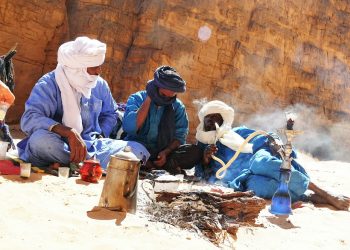 Interview with Mr. Kudret Özersay:
Interview with Mr. Kudret Özersay:
1. In January has passed away at the age of 88 years, Rauf Denktash, political leader and founder in 1983 of the Turkish Republic of Northern Cyprus, of which he has been President. A “historic hero” according to the Turkish newspaper Millyet. Interpreter of the Kemalist Thought he was, for half a century, a point of reference for the battered turkish Cypriot communities. What is Your assassment on?
For the Turkish Cypriots, Rauf Denktaş was an “icon of struggle”. He could be described as the “father of a nation”. In real terms, beyond being a president, he was a community leader. He was significant for all the Turkish Cypriots, not only for those who liked him but also for those who did not in the sense that he carried the status of Turkish Cypriots from being a community to a state. Even his opponents agree that his policies were consistent and stable.
2. Despite the passage of years the issue of Northern Cyprus, a Nation without international recognition, apart from of Turkey, seems to be adamant in front of a changing world. In reality, the relationship with your counterpart of the South are getting worse. Is not so?
There is a clear disparity between the two sides and a disadvantageous situation particularly for the Turkish Cypriot side. This factual situation affects the success in the negotiation process negatively because it creates the feeling and the perception to the Greek Cypriot side that anything and everything can continue to happen in the absence of a comprehensive settlement. This treatment to the Greek Cypriot Administration discourages not only the Greek Cypriot Administration but also the Greek Cypriot Community about a compromise settlement.
3. The unwillingness to reach an agreement, however, I’think, is attributable to the Greek part. On 24 April 2004, in Cyprus, both in the Greek and Turkish sides, has been voted for the referendum on the latest version of the plan, presented by the UN Secretary General, Kofi Annan, for the reunification of the island. The Greek Cypriots, in the great majority (75.83%, 313,704 votes) voted against. The Turkish part of Cyprus was rather in favor (64.9%).
As clearly reflected in the 2004 Report of the UN Secretary General following the failure of the referenda to bring a settlement, the main reason for the rejection of the Greek Cypriot Community was connected to the unwillingness to share power and prosperity with the Turkish Cypriots in Cyprus. Therefore it is the responsibility of the international community to create the necessary environment and to provide the relevant incentives to encourage the Greek Cypriot Community to be ready to accept reciprocal concessions. In the absence of this, it is not realistic to expect a viable settlement in near future.
4. The South island is known as a holiday paradise. What are the economic resources of the North island? You have a highly developed educational system, Your university is renowned throughout the world.
Tourism and higher education is the main economic resources of North Cyprus. However both of these sectors are facing challenges and difficulties resulting from the obstructions of the Greek Cypriot Administration.
Indirect flights with the requirement to stopover in Turkey which are not time and cost efficient because of additions to the prices deriving from extra costs, causes undue inconvenience to the visitors, makes flying to North Cyprus less preferable and discourages them from visiting the TRNC.
Apart from the issue of direct flights Greek Cypriot propaganda has been one working for the discouragement of people from visiting north Cyprus.
When it comes to our universities, baseless allegations are trying to be made heard by the Greek Cypriot propaganda even regarding to the recognition of diplomas given by these higher education institutions. These attempts to create an image as if dealing with the Turkish Cypriot universities is problematic cause unnecessary and disadvantageous situations for both the students and the instructors of these universities.
5. Cyprus, represents only by the Greeks, will be taking on the EU Presidency in the second half of 2012 and will therefore be present in the ”troikas” from January 2012 until June 2013. Turkey does not want to sit at the same table as Greek-Cypriot representatives. How do You see the question?
The existing deadlock in the negotiation process is because of the internal dynamics of the process and it is not related to the EU Presidency of the Greek Cypriot Administration. It is totally unfair to expect Turkey to have normal dialogue with the Greek Cypriot Administration during this six months period while the EU in general and the Greek Cypriot Administration in particular completely ignores the public institutions of the Turkish Cypriot state.
In fact there are other important problems in Turkey’s EU accession process and I do not think that this approach of Turkey will cause any problems because Turkey will continue her dialogue with the European Commission anyway. On the other hand, this short period will create a good opportunity for the EU if it wants to question the mistake done in 2004 which was the acceptance of the accession of the GCA to the EU in the absence of a comprehensive settlement.
6. Cyprus could become a key geopolitical and geo-strategic player in the Mediterranean Region, offering opportunities for new oil and gas supply routes to Europe, after its dicovery in the eastern Mediterranean Sea. A fact that is risking escalating tensions with Turkey and other players. Is not so?
Unilateral use of these resources by the Greek Cypriots before a settlement is reached in Cyprus is totally unfair. Last year in September, President Dr. Derviş Eroğlu made a proposal to the Greek Cypriot Administration regarding the issue, according to which the right thing to do in this connection was to act together even if these resources were to be used before a settlement.
Cooperation of this kind is highly important when one takes into consideration the great need to build confidence between the two communities. Otherwise, this particular attitude of the Greek Cypriot Administration will import the problems of the Middle East in the Cyprus problem through which the latter would become even more problematic. As also mentioned within your question, this may escalate the tension in the Eastern Mediterranean region.
7. The third largest political party of the Hungarian National Assembly, the Jobbik party (Movement for a Better Hungary) submitted a draft resolution to Parliament on 12 May on resolving the political and economic isolation of Northern-Cyprus. There are in Europe other political forces which support Your cause?
Political parties in our state are experiencing real challenges by virtue of the isolations preventing them from participating in the political party organizations in Europe. On the other hand, the political parties in the south have a great advantage in that respect. Therefore creating political forces supportive of the rightful cause of the Turkish Cypriots or increasing their number is not very easy. While the Greek Cypriot side directly prevents the EU as an institution from taking positive steps regarding the isolations of the Turkish Cypriots, it also spends the outmost effort to prevent the EU member states individually through the Greek Cypriot political parties.

















